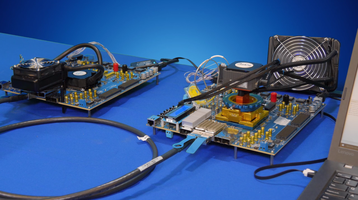Intel has started shipping Stratix 10 SX, a field-programmable gate array (FPGA) system with an integrated chip based on technology designed by ARM.
The device is positioned as a hardware acceleration platform for applications in networking, security and analytics. It is built using technology Intel obtained with the purchase of FPGA specialist Altera for $16.7 billion in 2015, marking the company’s biggest ever acquisition.
Buried hatchets
FPGAs are integrated circuits consisting of logic blocks that can be configured by the customer on the spot to accelerate specific workloads. The technology has been around since the 80s, but has seen a surge of interest in recent years, with the emergence of new types of resource-intensive tasks like machine learning, bulk video processing and genomics.
Stratix 10 SX offers over a million logic elements and is designed to work in combination with Intel Xeon processors, application-specific integrated circuits (ASICs) and DDR4 memory.
In order to increase processing speed, it features an integrated quad-core ARM Cortex-A53 clocked at 1.5GHz – the same design that powers a wide range of smartphones and the third iteration of Raspberry Pi.
Stratix 10 SX also features the HyperFlex fabric architecture built on the Intel 14nm Tri-Gate process, enabling faster connections between FPGA elements and lower power consumption over its predecessors, like Stratix V.
“With Stratix 10 SX, Intel reaffirms its ‘all in’ commitment to SoC FPGA devices combining integrated, flexible ARM cores with high-performance Intel Stratix 10 FPGAs,” said Reynette Au, vice president of marketing for Intel Programmable Solutions Group.
“We now provide a wide set of options for customer needing processors and FPGAs, with device offerings across the low-end, mid-range and now, high-end FPGA families, to enable their system designs.”
Two years after purchasing Altera, Intel is stepping up the marketing of this promising but comparatively expensive technology: earlier this month, the company announced the Intel Programmable Acceleration Card, built around Altera’s Arria 10 GX FPGAs.
Intel is also due to release a software platform to simplify massively parallelized hardware offloading.

